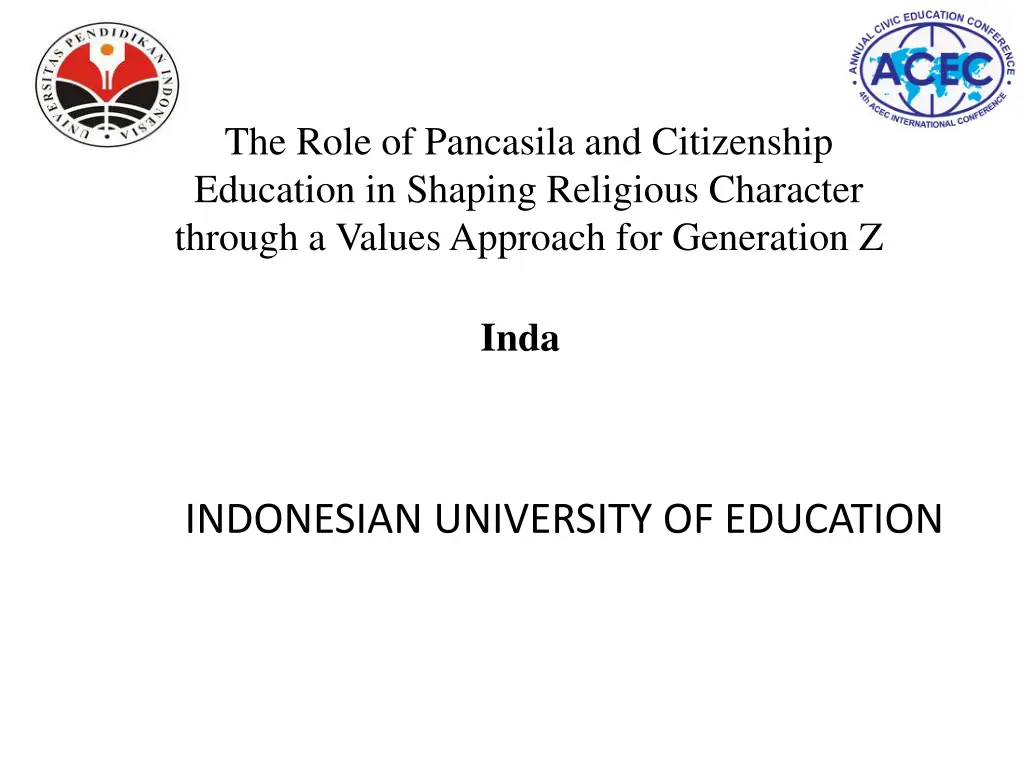
Shaping Religious Character: Values Approach in Generation Z Education
Explore the role of Pancasila and citizenship education in shaping the religious character of Generation Z through a values-based approach. Discover the significance of moral education and character formation in the context of Indonesian University of Education. Uncover the impact of environmental and innate factors on character development, supported by a qualitative case study method. Delve into the essence of value education and its alignment with moral education goals, focusing on the importance of Pancasila values in ethical systems.
Download Presentation

Please find below an Image/Link to download the presentation.
The content on the website is provided AS IS for your information and personal use only. It may not be sold, licensed, or shared on other websites without obtaining consent from the author. If you encounter any issues during the download, it is possible that the publisher has removed the file from their server.
You are allowed to download the files provided on this website for personal or commercial use, subject to the condition that they are used lawfully. All files are the property of their respective owners.
The content on the website is provided AS IS for your information and personal use only. It may not be sold, licensed, or shared on other websites without obtaining consent from the author.
E N D
Presentation Transcript
The Role of Pancasila and Citizenship Education in Shaping Religious Character through a Values Approach for Generation Z Inda INDONESIAN UNIVERSITY OF EDUCATION
Introduce Education is one of the most important factors in a person's life. Because through education a person can improve intelligence and skills, develop self-potential and personal responsibility, intelligent and creative. the social habits and behavior of the Zelenial generation the fact that the future of a society depends on educated and character people, and people cannot have good moral character alone.
Literature review The process of developing a person's character and character is influenced by several factors, namely environmental factors (nurture) and innate factors (nature). Then it is also explained that in the context of environmental factors as external factors that shape character, education becomes very important. Komalasari (2017, p. 14) Religion is a belief about religion that is attached to a person to carry out the teachings of the religion he adheres to as a guide in his life, as well as being tolerant and living in harmony with other religions. Generation Z is a generation that was born and developed in the era of digital technology advancement which was born in 1996- 2009
Research methods This approach uses a qualitative approach with a case study method. Because through this will support the achievement of research by researchers, through this method researchers examine in depth the elements and participants in the study. Research with descriptive study method will examine in depth about certain phenomena or events, which can then be linked to certain categories, social and processes
RESULTS AND DISCUSSION According to Kaelan (200) Civic education as a value education in this case is a moral value. In the classification of philosophy, values are distinguished into logical values, aesthetic values, and ethical (moral) values, through a philosophical approach it is said that Pancasila is an ethical system, a value system Based on the philosophy of education in Indonesia, namely education based on Pancasila and the 1945 Constitution, it is better to learn Pancasila values by emphasizing the value inculcation approach as the goal, while the learning process can use a variety of other approaches. Value education has the same essence and meaning as moral education, moral education, character education, or character education. The goal is to form a good person.
RESULTS AND DISCUSSION The creation of civilized humans in accordance with the rules of values and norms so that the role of Pancasila and citizenship education applied in schools can play an important role in shaping religious character for generation Z The results of the study show that Pancasila and Citizenship Education through a values approach have a positive role in Generation Z, namely by applying the habituation of values that apply in their social environment.
Conclusion The existence of Civics in the learning process of students in schools is very closely related to the formation of civic character that is instilled in students through a values-based approach, not only the introduction of values that are carried out, but also internalizing these values to students in order to achieve the attributes of civil society which are characterized by a supreme belief in God. one, just and civilized humanity, united in the Unitary State of the Republic of Indonesia, democratic-constitutional, social justice for all Indonesian people, have diversity in diversity, uphold human rights and obligations and love world peace.
reference Winarno. (2012). Pendidikan Pancasila di Perguruan Tinggi Panduan Praktis Pembelajaran. Yuma Pustaka: Surakarta. Winarno. (2014). Pembelajaran Pendidikan Kewarganegaraan Isi, Strategi dan Penilaian. PT Bumi Aksara: Jakarta Winarno, Wijianto. (2010). Ilmu Kewarganegaraan dalam Konteks Pendidikan Kewarganegaraan (Ikn-PKn). Laboratorium PPKn UNS & UNS Press: 2010 Maksudin. (2013). Pendidikan Karakter Nondikotomik. Pustaka Pelajar: Yogyakarta.






















